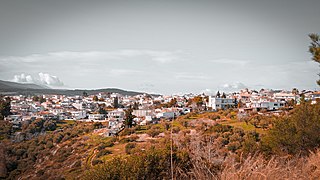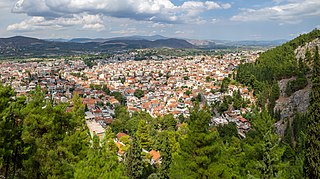Thebes or Thebae may refer to one of the following places:
Asopus is the name of four different rivers in Greece and one in Turkey. In Greek mythology, it was also the name of the gods of those rivers. Zeus carried off Aegina, Asopus' daughter, and Sisyphus, who had witnessed the act, told Asopus that he could reveal the identity of the person who had abducted Aegina, but in return Asopus would have to provide a perennial fountain of water at Corinth, Sisyphus' city. Accordingly, Asopus produced a fountain at Corinth, and pursued Zeus, but had to retreat for fear of Zeus' terrible thunderbolt.
Orchomenus or Orchomenos or Orkhomenos may refer to:
Athens is the capital of Greece.
Tripoli or Tripolis may refer to:
Pyrgos or Pyrgus may refer to:
Neapoli or Neapolis may refer to:

Tanagra is a town and a municipality north of Athens in Boeotia, Greece. The seat of the municipality is the town Schimatari. It is not far from Thebes, and it was noted in antiquity for the figurines named after it. The Tanagra figurines were a mass-produced, mold-cast and fired type of Greek terracotta figurine produced from the later fourth century BC, primarily in Tanagra.

Livadeia is a town in central Greece. It is the capital of the Boeotia regional district. Livadeia lies 90 km (56 mi) north-west of Athens, 64 km (40 mi) west of Chalkida, 63 km (39 mi) south-east of Lamia, 44 km (27 mi) east-south-east of Amfissa, and 91 km (57 mi) east-north-east of Nafpaktos. The town lies some five kilometres west of Greek National Road 3, to which it is linked by National Road 48.
Cabira or Kabeira was a town of ancient Pontus in Asia minor, at the base of the range of Paryadres, about 150 stadia south of Eupatoria or Magnopolis, which was at the junction of the Iris and the Lycus. Eupatoria was in the midst of the plain called Phanaroea, whereas Cabira, as Strabo says was at the base of the Paryadres. Mithridates the Great built a palace at Cabira; and there was a water-mill there, and places for keeping wild animals, hunting grounds, and mines. Less than 200 stadia from Cabira was the remarkable rock or fortress called Caenon, where Mithridates kept his most valuable things. Cn. Pompeius took the place and its treasures, which, when Strabo wrote, were in the Roman Capitol. In Strabo's time a woman, Pythodoris, the widow of King Polemon, had Cabira with the Zelitis and Magnopolitis. Pompeius made Cabira a city, and gave it the name Diospolis (Διόσπολις). Pythodoris enlarged it, gave it the name Sebaste (Σεβαστή), which is the Greek equivalent to Augusta, and used it as her royal residence. Near Cabira probably at a village named Ameria, there was a temple with a great number of slaves belonging to it, and the high priest enjoyed this benefice. The god Men of Pharnaces was worshipped at Cabira. Mithridates was at Cabira during the winter that L. Lucullus was besieging Amisus and Eupatoria. Lucullus afterwards took Cabira. There are some autonomous coins of Cabira with the epigraph "Καβηρων".
Oenoe, also written Oinoi or Oene, may refer to:

Pontus was a Hellenistic kingdom centered in the historical region of Pontus in modern-day Turkey, and ruled by the Mithridatic dynasty of Persian origin, which possibly may have been directly related to Darius the Great of the Achaemenid dynasty. The kingdom was proclaimed by Mithridates I in 281 BC and lasted until its conquest by the Roman Republic in 63 BC. The Kingdom of Pontus reached its largest extent under Mithridates VI the Great, who conquered Colchis, Cappadocia, Bithynia, the Greek colonies of the Tauric Chersonesos, and for a brief time the Roman province of Asia. After a long struggle with Rome in the Mithridatic Wars, Pontus was defeated.
Athenae or Athenai was a town of ancient Boeotia, on the river Triton, and near Lake Copais. Athenae, along with the neighbouring town of Eleusis, was destroyed by an inundation.
Eleusis was a town of ancient Boeotia, on the river Triton, and near Lake Copais. Eleusis, along with the neighbouring town of Athenae, was destroyed by an inundation.
Athenae or Athenai was a city and port of ancient Pontus, with a Greek temple of Athena. According to Arrian, it was 180 stadia east of the river Adienus, and 280 stadia west of Apsarus. Procopius writes that the name of the village came from a certain woman named Athenaea in early times who ruled over the land and not because, as some believe, of colonists from Athens settled there. He also adds that the tomb of the woman was still there. Arrian speaks of the place as a deserted fort, but Procopius describes it as a populous place in his time. Konrad Mannert assumes it to be the same place as the Odeinius of the Periplus of Pseudo-Scylax.
This page is based on this
Wikipedia article Text is available under the
CC BY-SA 4.0 license; additional terms may apply.
Images, videos and audio are available under their respective licenses.


